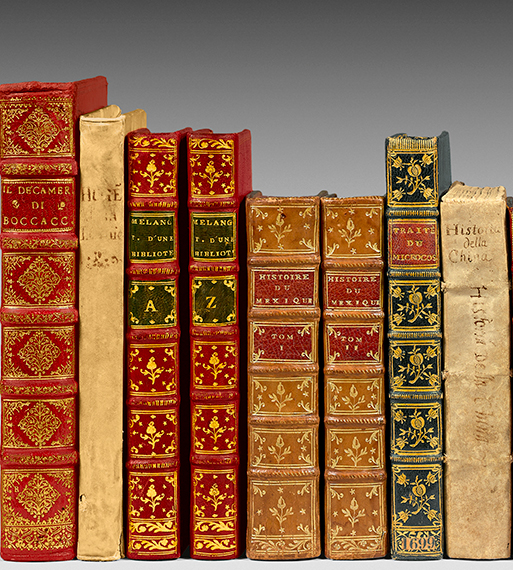Very rare edition of Aristotle’s “Logica” given in Paris in 1536
par by the bookseller-humanist Jean Petit.
Magnificent copy of Bernhardus Rascher who calligraphed the date 1544 on the volume,
preserved in its beautiful period binding of cold-stamped pigskin.
Paris, 1536.
Aristoteles (384-322 BC). Logica. Libri logicorum ad archetypos recogniti…
Paris, Jean Petit, 1536.
In-folio, 271 ff. and 1 f. of mark (some pagination errors but complete). Cold-stamped pigskin, brass clasps and fastenings, ribbed spine. Binding de of the period.
326 x 207 mm.
Aristotle’s most influential foundational texts on logic in a beautiful contemporary pigskin over wooden board, richly rollstamped and with 2 brass clasps.
With woodcut title border and numerous woodcut diagrams and figurative and ornamental metal and woodcut initials in the text, ending with a large woodcut printer’s device.
“Follows the 1531 edition, no. 26.
Avignon. Barcelona, BU. Berlin, SB. Freiburg, BCU. Genoa, BC (incomplete title). Geneva, BPU. Lisbon, BN. Munich, BSB. Pamiers. Poitiers, BU. Saint-Dié”. (Renouard, ICP, V, 23)
Important edition, with an introductory work by Jacques Lefèvre d’Etaples, a paraphrase of Porphyry’s preface to his disciple Chrysaorius., printed by Jean Petit, on the presses of Pierre Vidoue.
Jean Petit, a printer at the beginning of the 16th century, was one of the four main booksellers of the University of Paris and greatly contributed to the spread of early Renaissance humanism. He published a large number of original editions. Among his collaborators were Robert Estienne and Josse Bade. Petit was an example of an early successful printer.
In his course of Logic, Kant wrote this: “ Current logic originates from ‘l’Aristotle’s analytics. This philosopher can be considered as the father of logic.’ d’Aristote. Ce philosophe peut être considéré comme le père de la logique ».
Aristotle (384-322 BC) is certainly the founding father of classical logic, but he is also largely at the origin of Western philosophy of language in my opinion. In Aristotelian theory, logic and language are indeed closely linked, within a vast organization of knowledge. Heidegger does not fail to point out that “it is to Aristotle himself that we owe a more distinct metaphysical interpretation of the Logos conceived as the proposition. This conception of the essence of the Logos later became exemplary and normative for the constitution of logic and grammar.”
Aristotle’s theory enjoyed immense success. Over time, it influenced rationalists and idealists as well as empiricists and realists.
Aristotle remains a fundamental reference, at least from the standpoint of a history of thought and even, one might say, of a history of reflective thought, in other words, one that studies its own mechanisms.
It is known that the various texts of Aristotle concerning questions of logic have been grouped into a vast ensemble called the Organon (literally: tool, instrument). This gives us six logical treaties: the Categories, a treatise that studies the constitutive terms of the proposition; On Interpretation, which studies propositions, that is to say, combinations of terms; the Prior Analytics or analytical study of reasoning and its main form, the syllogism, and the Posterior Analytics, which particularly study the scientific syllogism, these two treaties constituting the study of interpropositional relations, a study that naturally follows that of propositions; then, the Topics, in fact probably written before the Prior Analytics and the Posterior Analytics, and which propose a method of argumentation from probable premises; finally the Sophistical Refutations, which aim to dismantle the mechanisms of the sophists’ refutations, in other words, the paralogisms they are accustomed to.
Aristotle’s contribution to philosophy, logic, and language analysis is considerable. This fact is known and is almost a commonplace, but it is still important to demonstrate it in each era by re-reading his work in the light of advances or innovations in the world of thought. Let us not forget, moreover, that this appreciation is not unanimous. It is, in any case, striking to note that the debate between Platonists and Aristotelians remains in the scientific world (among mathematicians, for example). The master, Plato, and the disciple, Aristotle, who freed himself from the master to set things right side up and rehabilitate the sensible world, remain ultimately two major references even today.
As for theOrganon, it represents the first significant corpus addressing logic and language systematically. It is, despite criticisms and the trials of time, despite the necessary evolution of thought, a central work that has inspired logicians, philosophers of language, and linguists, often unwittingly, and even into school grammar since its ancient origins. The fertility of the Aristotelian method is undeniable, and the debates it has initiated are far from closed or outdated. Even for our contemporaries, theOrganon remains a cathedral of classical logic.
Magnificent copy of this very rare edition preserved in its beautiful period binding of cold-stamped pigskin over wooden boards, from the library of the humanist Bernhardus Rascher with the calligraphed date of 1544.
